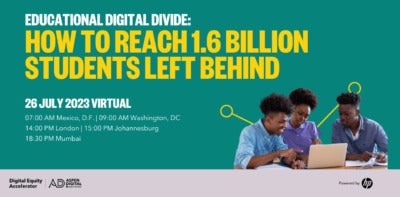Educational Digital Divide: How to Reach 1.6 Billion Students Left Behind
The numbers are staggering: 1.6 billion students faced learning disruptions as a result of COVID-19 – and half of those did not have access to a computer at home. Without digital access, use, and fluency, students are excluded from access to economic opportunity, education, healthcare and experience worsening discrimination and social isolation.
New research shows these effects are lifelong, affecting not just the student but their families’ and communities’ ability to build strong economic futures.
Not all interventions are created equal. What do we know about what works – and what doesn’t – for closing the generational digital divide? How can we build robust cohorts of young people skilled in digital literacy and with access to job pathways? What are effective models of closing the “last mile” access gap for educators and students?

On 26 July 2023, join us for a conversation showcasing organizations around the world which have been working in their communities to close the generational digital divide, do it equitably, and build solutions that work so youth can use technology to achieve their dreams.
Speakers:
- Hazami Barmada, Project Lead, Digital Equity Accelerator
- Jessica Ángeles, IIDEAC (Mexico)
- James Donald, Executive Director of E-Cubed/ DBE-3 (South Africa)
- Rebecca Lin, Head of Education, Dignity for Children Foundation (Malaysia)
The Digital Equity Accelerator, an initiative of the Aspen Institute in collaboration with HP Inc., fuels social innovation by investing in local NGOs working to address social and economic injustices that are exacerbated by unequal technology access and use around the world.